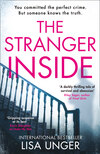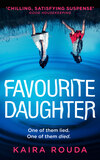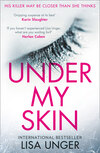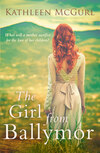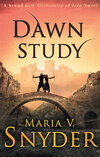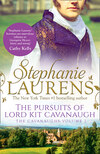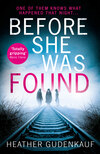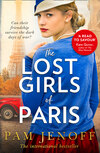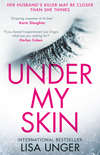Kitabı oku: «The Stranger Inside», sayfa 5
NINE
Rain saw the dog first, a German shepherd that sat still and stiff as a sentry beside the big man. Large, mostly black but with tawny fur on the legs, belly and around the eyes. She’d seen the man before. Somewhere. Where? She felt a flutter of unease in her belly.
“Good morning,” he said.
He seemed nice enough, a slight smile playing at the corners of his mouth. He pushed his thick black glasses up his nose, stayed where he was beside the creek. Just sitting. He wore a black jacket, too hot for a summer day. His hair was long, pulled into a loose ponytail, his beard thick and long. He was heavy, very overweight.
“Good morning,” said Tess sweetly.
Rain didn’t say anything, just moved quickly toward Tess and grabbed her hand, started pulling her away.
“We’re late,” she said.
“Didn’t your mom teach you to be nice?” asked the man.
She bristled, annoyed. In fact, her mother had not taught her to be nice, and neither had her father.
“My mom,” she snapped, “told me not to talk to strange men in the woods.”
She got in trouble sometimes at school, for speaking out, for talking back. That’s your father in you, said her mother, not angrily. She didn’t get in trouble at home for that sort of thing. She could say what she wanted to her parents, speak her mind, give her opinion. She was allowed to get angry, to yell even. She was allowed to be sad, frustrated, to cry. Her mom was a big believer in letting it out and talking it through. Rain’s mother taught her that even though the world always wants girls to be nice and sweet, quiet, hold it all in, you don’t always have to be that. Own your feelings. Speak your mind. Know your boundaries. Protect them.
The big man stared, displeased she could tell, though she couldn’t say how since his face didn’t change. Then he released a low whistle and that big dog trotted over to block their path to Hank’s. Rain tugged Tess closer.
The beast stood panting in front of them, legs wide, head low. He wasn’t big. He was huge. His eyes were black, his tawny chest wide and muscular.
“Don’t worry,” said the man, not moving. “He’s friendly.”
The dog bared his teeth and started to growl.

It was a bright golden morning, sun washing in through the gauzy drapes, painting the room. Lily cooed happily on the monitor. The tendrils of the nightmare clung, pulling Rain back into the gloom.
She took a few breaths to calm herself. That place. That dog. Why was she back there? Never mind, scratch that. She knew why.
The bed beside her was cold and empty. Greg had left a note: “Thought it was better for you two to sleep. Rough night.”
It was nearly 9 a.m., an epic sleep-in by current standards. It had been a rough night, Lily waking twice, emitting suddenly and inexplicably that high-pitched wail perfected by babies everywhere to fry each nerve ending in their exhausted mothers’ bodies. Rain had nursed Lily back to sleep once, then paced the hallway for what seemed like hours after the baby woke a second time. Teething? Who knew? There’d been some late-night (or was it early morning) lovemaking—or was it just a dream? Did women dream about making love to their husbands? Maybe not. Her head throbbed.
“Maamaa,” Lily sang over the monitor. “Ahhh. Ohhh.”

It took an hour to get herself together, about fifty-six minutes longer than it used to take. She showered with Lily in the bouncy seat, found a pair of jeans she could squeeze into, a button-down shirt that didn’t gape over her boobs, dressed, dug out the messenger bag she used to carry with her everywhere, packed the camera and the portable digital recorder, a fresh Moleskine and package of Pilot V5 pens. Ready. Then Lily—fed, changed, diaper bag stocked, snacks, toys, strapped into her car seat. Okay.
Sitting in the driver’s seat and looking at Lily, red hair glinting gold in the morning light, Rain briefly wondered about the wisdom of bringing a baby to a crime scene. A crime scene that, with the help of Henry, and her willingness to break rules and sometimes laws, she and Gillian planned to enter.
But what else was she going to do? She hadn’t left Lily with a sitter yet, though Mitzi kept offering. She wasn’t about to start on a whim. This was a whim, wasn’t it? The beginning of a story no one had asked her to cover? She’d just have to make it all work, right? When the road isn’t laid clear before you, her mother always said, forge your own path.
Admittedly, this probably wasn’t what she had in mind.
The drive went quickly, traffic light, the day clear. She knew the way. She’d been where she was going before, too many times.
She and Gillian had stood among the throng of reporters always gathered outside the Markham house during Laney’s disappearance, then when she was found. Sweltering afternoons, and long nights, emotions high. She remembered so clearly the feel of it—the dread, the fatigue, the intensity of every new piece of information, the tragic unfolding of the story. They’d lived it—barely going home, eating and sometimes sleeping in the news van. Her life, Greg especially, sorely neglected.
No crowds today as she approached; the Markham house had an air of desertion and the street was quiet, the overgrown and neglected yard edged with black-and-yellow crime scene tape. An empty squad car sat in the driveway, and a dark sedan blocked the property from street access. The message was clear: stay away.
Halloween decorations abounded on neighboring houses—striking a different tenor than those on her own street. Here, lawns had been turned into graveyards, skeletons hung from trees. As she pulled up the block, a grim reaper stood sentry by a tilting mailbox, a giant inflatable spider dominated another small yard.
Rain parked past the house, something tingling. A strange déjà vu, as if she’d played this scene out already, an odd sense of unease. She went around to the back to unpack Lily and put her in the sling.
Diaper bag over one shoulder, work satchel over the other, she approached the familiar white van. Gillian and their longtime driver, Josh, were in the cab, bent over something Rain couldn’t see, Gillian talking, Josh nodding. They looked up as she approached, and both started waving.
Gillian emerged, svelte in a white pencil skirt, and blue silk blouse, heels. She tossed her honey hair, gazed at herself in the side mirror, leaning in close to examine her skin. Gillian out in front, Rain behind the scenes. That’s how it had always been, and how they both liked it.
“Oh, wow,” Gillian said, eyes falling on Lily. “You brought Lily.”
Rain shrugged, looking at Lily, who gazed up at the falling leaves, pointing. “I don’t have a sitter.”
“Of course,” said Gillian, giving her a serious, thoughtful frown. “Right.”
How was this going to work? She hadn’t exactly thought it through.
But Gillian was already cooing, lifting the baby from the sling, Lily kicking her legs with happiness. And Rain was greeting Josh, a big man with a full, prematurely white beard and glittery blue eyes. Jeans, flannel shirt, faded denims—he was rough and ready just like always.
“I had a feeling you’d be back sooner rather than later.”
Why did everyone keep saying that? He pulled her into a bear hug, which she gratefully returned. This was one of the things she missed most about work—her friends.
“I’m not back,” she said. “I’m just along for the ride.”
“Oh, sure.”
“So how are we going to do this?” asked Gillian, balancing Lily on her slender hip. She and Rain locked eyes, mind-melded, then looked at Josh.
He raised his eyebrows. Late forties, father of three, the man you called in any crisis, always awake, always at the wheel and ready to go before anyone else.
“Toys, books, snacks?” he asked, regarding the baby. Rain handed over the diaper bag, which he easily slung over his shoulder.
“All right, Miss Lily,” he said. “Let’s do this.”
And of course, Lily, the effortlessly friendly little spirit that she was, happily went to her new friend, grabbing ahold of his beard. Hard.
“They always do that,” said Josh, wincing and carrying her to the cab.

Gil ducked under the tape and Rain followed, moving quickly, with purpose, as if they belonged there. That was key, always look like you knew where you were going—even when you were essentially breaking and entering. Good girls don’t get answers.
Gillian knocked on the door, just to be sure the house was empty. And it was, just as Henry had promised.
“Crime scene techs are done,” he’d told her. “According to my source, FBI left this morning. They’ll have a patrol car there tonight, just to keep away any lookie-loos. My guy can leave the side door open for you.”
“Thanks, Henry.”
“Don’t get caught,” he warned. “And if you do, don’t mention me.”
“Come on.”
“What are you looking for? Do you even know?”
“I’ll know it when I see it.”
Gillian and Rain walked over to the side of the house, Rain faster in her jeans and sneakers than Gillian was in her heels. She always dressed as if she was about to go on camera. Rain, on the other hand, would be in her pajamas everywhere she went if it were socially acceptable.
“This is where the second part of our story begins,” Rain said, standing at a paint-splattered door with a rickety knob and a small glass-paned window covered with grime. She had the portable digital recorder in her hand.
“In the early hours of October 2, an unknown assailant broke into the house at 238 Pine Drive and killed Steve Markham.”
Rain felt her heart race, wondering if this was how the killer got in. They pushed inside to a musty garage, moved past a parked silver Mercedes-Benz, some stacks of boxes, a humming furnace.
“When he was acquitted of the murder of his wife, we thought that was the conclusion of the story,” said Gillian. This is how they did it: investigated together, took pictures, wrote notes, made snippet recordings. Later, Rain would weave together the full piece, write it, Gillian doing the reporting.
“I guess someone wanted to revise the ending,” said Rain.
They found the interior door unlocked, pushed it open and stepped into a small laundry room. There was a strong odor in the house—mold, garbage, something else—a chemical edge, something that tickled the inside of Rain’s nose.
She already had her camera out, stuck the recorder in her pocket, started snapping pictures.
A small house, tastefully decorated with budget items from Target—that kind of pretty, faux-distressed, almost modern look that was so in style. Laney Markham was a nice girl, and her house reflected that—a worn teddy bear on the couch, photographs of her family, a pretty collection of shells and candles on the dining room table, pretty dishes all in a row. They were always careful to keep her top of mind in their reporting, never wanting her life to be overshadowed by how she died, or by the man who killed her.
Gillian took the camera from her. Rain scribbled notes. Their work together was silent and quick. They wouldn’t need pictures for the broadcast—if there was one—but it would help Rain when she was writing.
“In here.” Rain walked into the living room. “Henry said he was killed in here.”
There should be some electricity on the air, shouldn’t there? Some energy that set their skin to tingling. But it was just a quiet living room, some furniture clearly removed. The only evidence that someone had died was a thin spray of blood on the carpet that had been taped off in black, a chunky geometric outline around an organic splatter, like a macabre modern art installation.
“What are we doing here?” asked Gillian. She looked pale suddenly. It wasn’t like her to get squeamish. They’d seen so much. The horrors people do. They knew it too well.
“We’re documenting,” said Rain. “Like we always do.”
“For what?”
“For the rest of the story.”
“Are you back?” asked Gillian, letting the camera dangle from the strap around her neck. “You know Andrew wants you to come back.”
Andrew Thompson, executive producer of National News Radio Morning Edition, a bespectacled salt-and-pepper hottie who was equal parts ambition and brilliance. Rain had loved working with him, even though he was a major pain in the ass—an exacting editor, a ruthless fact-checker, a steely perfectionist.
He’d tried to talk her out of quitting, dropped the occasional email asking how was the life of the stay-at-home mom. Her job was waiting for her; she knew that.
“I want you to come back,” Gillian said.
Before Rain could answer, Gillian’s phone pinged. She glanced at it, then back to Rain, frowning.
“Someone’s coming. We have to go.”
Rain glanced out the window; a black sedan was pulling up behind the news van. Gillian headed for the door, but Rain grabbed the camera and took one more look around—a quick loop through the bedrooms, the kitchen. She snapped more photos.
What was she looking for?
They’d start the feature here, in the house, the day after. They’d work their way back. She could already feel it—the pace, the tendrils that reached into the past, the big questions at its center. She took a photo of the blood splatter.
She was about to follow Gillian when she saw it, a red glitter out of the corner of her eye by the window, under the curtain.
“Let’s go,” said Gillian from the laundry room. “We’re going to get arrested—again.”
They couldn’t get arrested, not with Lily here. Greg would kill her.
She pulled back the curtain. There in the mesh of the carpet was a bright red crystal heart about the size of a quarter. The blood started rushing in her ears, the room tilting a little. No. It wasn’t possible.
“Rain!”
She grabbed it and shoved it in her pocket, chasing after Gillian.
“What were you looking at?” asked Gillian as they exited into the yard. “You’re white. What’s wrong?”
“Nothing. I just thought—Nothing.”
“Hey.” Gillian stopped her, her bright blue eyes turning on Rain like interrogation lamps. “What’s going on?”
“I’m—not sure.”
The fine lines around Gillian’s eyes deepened, her brow furrowing with worry.
“Rain, what aren’t you telling me?”
But then another ping on her phone had Gillian pulling her toward the street. The sedan, which had been moving slowly up the street, sped up and disappeared from view.
“Sorry,” said Josh as they approached. “False alarm, I guess.”
“That’s okay,” said Gillian. “Not much to see after all.”
There were things that no one knew about her. Not Gillian, not Greg. Not even her father. In fact, there was only one person who knew her completely. That secret self, that stranger inside, hid the crystal heart in her palm, clenched her fist around it so tightly it started to hurt.
TEN
“Didn’t your mom teach you to be nice?”
“My mom told me not to talk to strange men in the woods,” she said.
She wasn’t scared yet. But Tess was; she took hold of Rain’s arm. But really, she was still Lara then, Laraine Winter. Laraine was a name her father made up, part Lawrence, part Lorraine, his parents. He’d insist always to people, continuously annoyed by their failure to do so, that it be pronounced LAH-raine. Not LOR-raine, which is how people always said it. He was annoyed when she started calling herself Lara.
It’s common, he’d sniff.
That’s the point, she said. I just want to be like everyone else.
The name wasn’t exotic or cool the way he imagined it. It was just—awkward. She hated it. But her father didn’t like to be edited.
Her mother spoke up. Let her call herself what she wants to, she said. Not everything is about you.
“Lara,” whispered Tess, pulling her close.
The dog blocked their path from the bridge. And as he stood there, panting, with a thin line of drool trailing from the curl of his lips, she felt the first lick of fear, a desire deep and primal to run for home.
“Call your dog off,” she said.
Tess was making a small sound. The three of them joked that Tess was Piglet, and Lara was Tigger. And Hank, of course, was Eeyore, sometimes Pooh. At another moment, she would have laughed about that sound Tess was making. Except it wasn’t funny.
“He won’t hurt you,” said the man.
He was disgusting. Big and slovenly, dressed all in black, with a bushy, unkempt beard and thick black-rimmed glasses. With effort, he’d pulled himself from his crouch. He was enormous, too, well over six feet tall.
“Call him back,” she said, this time making her voice deeper and louder, the way her mother had told her. Say no like you mean it, Mom had taught her. A certain kind of man doesn’t hear any other tone. “No” shouldn’t ask for permission to exist. There’s no question mark after it.
But the man just laughed. It was almost a giggle, childish. She and Tess had their arms looped together, and in unison they started stepping backward, eyes trained on that dog. As they put distance between them, it bared its teeth, growl growing deeper. Tess started to cry.
“Tess, don’t run,” she whispered. “Whatever you do. Don’t run.”
“Oh,” said Tess, a single note of pure fear. “Oh.”
“You better stop moving,” said the man. He lumbered his way up the bank. He would never be able to catch either one of them; she could see that. That’s why he had the dog. Tess had practically fused her body to Rain’s, and Rain gripped her tight. Her heart was a bird in the cage of her chest, throat sandpaper. Acutely she felt her own smallness, their isolation. She looked around for help. They were alone.
The black dog moved closer. Rain felt Tess pull away, start to unlace her arm. She tried to hold on to her, but her friend had gone blank with terror. Flight. That’s what Rain saw in her friend’s face, the blank terror of someone about to flee.
“Go, Wolf.” His voice was a stern command.
When the dog started moving, Tess broke and ran. Rain tried to grab for her friend, but she couldn’t hold her. The dog moved past Rain in a black blur. The man just stood on the edge of the bridge, his face blank, unreadable. His breath came ragged, a horrible wheeze.
What happened next was just a series of ugly sounds and images in Rain’s memory. Tess yelling as the dog grabbed hold of her calf, taking her down. Rain running toward them. Fur and flesh under her fingers as she tried to pull the dog off Tess, beating at the soft fur, feeling the muscles under her fists. A yelp, a sound that was nearly a roar, then teeth on her arm, then on her leg, a terrible tearing of her skin.
Tess scrambling away, blood trailing. Her own screaming. Then a vise grip on her shoulder, fingertips hard as stone. She was knocked to the ground, looking up into that face, moon-white above the beard, eyes glittering with glee. It almost looked like he was going to scratch his shoulder, the way he moved his arm in that direction. But the backhand that connected with her jaw, shattering it, knocked her out cold.

Rain took a deep breath, coming back to the present—her bedroom, Greg’s deep-sleep breathing. She moved in close to her husband and he wrapped her up in his arms without waking up. She held on tight, centered herself, matched her breathing to his.
I am not that girl. I am not in that place. It is behind me, part of my past. I survived.
Three a.m.: the hour of alchemy. Not the dead of night where sleep might fall back over her like a cloak, the light and energy of morning still distant, too far to draw her into the next day. Here, at 3 a.m., all her best ideas and her worst fears, worries, doubts mingled, an acidic potion of sandman dust, and whispers, and bad imaginings. Henry’s words—like someone else we know—an earworm that moved through her brain.
Eugene Kreskey was never far, no matter that he was dead, or that she’d buried him deep. He was always there.
She reached for the monitor, switched on the screen and looked at Lily, so peaceful, so safe and loved beyond measure. Her heart rate started to slow. So much therapy; so much talking. It was her father who suggested that she put that day in a box and lock it up tight, and never, ever open that lid.
“My father—who you never knew—he drank,” he told her. This was months after. Her grades were down; she was waking nightly in terror. She was having daily meltdowns over nothing. It wasn’t just the day in the woods, the horror of it. It wasn’t just her injuries—a jaw that clicked even after it healed, the scars from the dog on her leg; it was the loss of everything—Tess, Hank, the girl she was. She couldn’t figure out how to fit back into the world.
“When he did, he was a different man,” her father said. “He hurt me—badly.”
He did a thing he’d always done, circled one forearm with the long fingers of his other hand and rubbed. That night she noticed a scar, a deep gouge in the skin of his wrist.
The idea that someone could hurt her father had baffled Rain. How did you hurt the moon? That he had been a boy once, vulnerable, seemed like a lie, like the stories he made up for her about boys and girls who built jetpacks that took them to Saturn, who hunted dragons in the woods, who rode dolphins to a secret world under the sea.
“I could think about those times, about who he was and what he did, and let them define me,” he said. “But I don’t. I lock those memories away deep inside where they can’t hurt me.”
“How?”
“When they come,” he said, “you imagine them written on paper. Then you fold that paper and shut it inside the box. Lock it and throw the key down a well.”
She tried to imagine doing that. Did she feel better? Maybe a little.
She’d never met her father’s parents; they’d both died before she was born. There were some grainy black-and-white photos, a wedding portrait. They looked thin-lipped and severe.
“Do you hate him?”
Rain had so much hate in her heart after that day in the woods. It was a monster just barely caged in her brain, raging, knocking things around. She didn’t know how she could live with that much rage in her; it was a black fog over her life. Everything that once seemed beautiful or fun or funny was just ash. Who would she be now if her parents hadn’t gotten her the help she needed? She didn’t know, didn’t want to know.
Her father took off his glasses, those eternal round specs. “I did hate him—then. But now I understand what it’s like to have demons. To let them control you. I forgive him.”
He looked at her uncertainly, like maybe he was worried he’d said too much. It was late; he’d woken up with her after her nightmare, made her some warm milk. Now they sat on the porch together, looking up at the starry sky.
“I can’t forgive him,” she said. “I won’t.”
“No,” he said gravely. “That’s different. I won’t forgive Eugene Kreskey either. How can we?”
He reached for her hand. His hand was big and strong, enveloping her own.
“Look,” he said. “Let’s keep it practical. When the memories come, say this to yourself—I am not that girl. I am not in that place. It is behind me, part of my past. I survived because I am strong.”
But it wasn’t true. She’d survived because she was weak. She’d tried to explain this to her therapist, to her parents. No one seemed to understand that. You were a child, Lara. What else could you have done? She could imagine at least a million scenarios where things could have gone differently. Still, that mantra, it worked. It never failed to give her a little jolt, a boost out of the mire of her memories. Rain guessed the old man wasn’t a total failure as a father. Maybe she was too hard on him.

Finally, she just gave up on sleep. Who needs it when there’s coffee?
She extracted herself from the warmth of her husband’s arms and left the bedroom. She checked on Lily, then went to the room she and Greg used as an office, sat at her desk and checked her email. Nothing from Henry. She sent him a message, knowing him to be a chronic insomniac, and definitely not one to complain about 3 a.m. missives. Just a subject line: Did you forget about me?
She hesitated before going down the rabbit hole of social media. Did she really want to open that browser and get sucked into the vortex of Everyone Else—all the pretty lies, half-truths, curated moments, bravado, faux-humble braggadocio. Had she ever emerged from a social media romp with her self-esteem intact? No.
But she went anyway, wading through the lives of old school friends on whom, but for social media, she’d never have laid eyes again, colleagues who were doing (way, way) better than she was—or so it seemed, former editors she’d never really liked, distant cousins she hadn’t seen in a decade. The cavalcade of filtered images—trips to Venice, recipes for a Tuesday night, pots prettily bubbling on stoves, perfectly decorated rooms, pictures of children in all manner of comic mischief.
Rain’s own picture of Lily covered in sweet potatoes had earned her 250 thumbs up, hearts and laughing emojis. She was pathetically pleased, started scrolling through the comments. A note from her old friend, journalist Sarah Wright: What a cutie! Motherhood is the most important job in the world! The heart-eyed emoji! Rain clicked on Sarah’s page.
Honored and stunned that my feature on the opioid epidemic has been nominated for a Pulitzer Prize in Journalism. Am I dreaming?
Rain already knew about the nomination, of course. It was everywhere. And Sarah deserved it. She’d been working her ass off for decades. So, how was it possible to be happy for someone—because Sarah was a great person and a stellar journalist, and her series was, simply put, brilliant—and yet still feel a dump of despair so total that you almost needed to lie down. Sarah’s kids had been more or less raised by nannies and by Sarah’s mother—a fact over which Sarah herself had voiced poignant regret and had even written about. According to Gillian—who knew everything about everyone—Sarah’s daughter had just dropped out of Princeton and was living in Sarah’s basement. Sarah’s son, according to Gillian, didn’t even speak to her.
Women make choices, said Gillian, single and childless, by choice. We must. Do you want a Pulitzer Prize? Or do you want a happy kid? Men don’t have to make those decisions. There aren’t as many judging eyes on them.
Rain was ashamed to admit that she wanted both. Why couldn’t she have both? Wasn’t it just giving in to think you couldn’t do or have it all?
Anyway, Rain wasn’t online to bring forth her daily—or nightly—existential crisis.
She clicked on Gillian’s Twitter feed.
Why isn’t there more information on Steve Markham’s murder? read Gillian’s tweet. The Feds aren’t talking. What gives?
Her post had earned nearly a thousand likes and even more retweets.
Indeed, thought Rain. What gives?
She searched, scrolled through old articles about Markham that she’d read a thousand times. Old news from the investigation, the trial, his acquittal, his book deal, media appearances. Chatter online—women in love with him, feminists decrying the injustice of his acquittal, profiles on the crime blogs, and those sites dedicated to murder and murderers. Then the cursory stories about the recent discovery of his body. Nothing new, no threads to pull. Like Greg said, the sad end to an unjust story. Unless.
Her fingers hovered over the keyboard, then she entered a name into the search bar. She clicked on the first link:
The Boston Boogeyman Wayne Garret Smith, youth counselor, beloved in his community as an advocate for underprivileged boys. He ran an after-school sports program at the local recreation center for nearly twenty years. Smith received awards, grants, was featured in area papers for his tireless work on behalf of young men just like he had been. Orphaned at ten, he was raised as a ward of the state, never adopted, emancipated from the system at eighteen. He joined the army, went to college, married, had two young girls. He was an American success story, someone from the twisted beginnings of abuse who came through to thrive and help other young men, too.
Rain scrolled through newspaper articles, images from the trial, pictures of the three boys who went missing over a five-year period in the Boston area. (It was suspected that there were many more, but their bodies were never found. He had access to boys—his center a place where runaways could seek shelter for the night, get a hot meal, come for clothes or a shower.)
When the police brought Smith in, they had a rock-solid case: damning physical evidence in the form of trophies—a Spider-Man watch, a tattered old bear—not to mention the graphic photos Smith had taken himself. But Smith claimed his civil rights had been violated—that any admissions he’d made had been coerced, that he’d been brutalized by police, that the arresting officer had failed to Mirandize him, evidence had been planted.
After a lengthy trial, Smith’s high-profile attorney managed to establish enough reasonable doubt that he was acquitted. It was a travesty of epic proportions, the kind of case that haunted cops, crime beat reporters and prosecutors alike.
A year later, after an anonymous tip, Smith’s body was found in an abandoned barn deep in the woods on the outskirts of Boston. He died the way his young victims did—bound, in mortal terror, tortured, violated and humiliated. No physical evidence, no witnesses, suspects or leads. The killer was never found.
A little red 1 appeared over her mail icon. She clicked on it and there was a message from Henry. Subject line: For Your Eyes Only.
A burst of adrenaline. She clicked on the email and saw a slew of attachments: police reports from the Smith and Markham murders, crime scene photos, civilian security camera images.
Ücretsiz ön izlemeyi tamamladınız.
